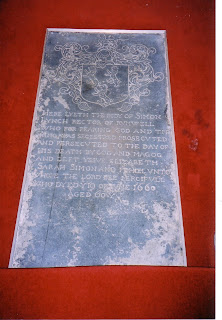
In the Priory Church of St Laurence is a memorial to a most colourful Blackmore character, Simon Lynch.
During an era of religious intolerance and political upheaval, in Essex, between 1643 and 1660, more preachers were ejected from their livings and replaced by Puritans than in any other County of England. This is not surprising because the County was a Parliamentarian stronghold with supporters keen to improve the quality of preaching. If the preacher was known to be a Royalist, or, maintained neutrality, then they were ejected. One such individual was Simon Lynch who was buried in the church. His epitaph reads:
Here lyeth the body of Simon Lynch
Rector of Runwell
Who for fearing God and the King
Was sequestered, prosecuted and persecuted
To the day of his death
By Gog and Magog,
And left issue, Elizabeth, Sarah, Simon
And Ithiel
Unto whome the Lord be mercifull
Who died ye 19th June 1660
Aged 60 yr.
Simon Lynch was appointed Rector of Runwell in 1629, and later, from 1646 or 1647, Curate of Blackmore. He was replaced as Rector at Runwell in 1644, by “Mr Oakely … a godly, able preaching minister” [Smith, 1934, p256]. An earlier entry before the Essex Archdeaconry Court, in March 1635/6, at Ingatestone states:
Simon Linch. Rector of Runwell: speaking incesscent and vasumly speeches in the chancell near the Communion table. Admonished and dismissed. [ERO D/AZ/2/14 p15].
Stephen Smyth’s appointment of Lynch to Blackmore was unpopular with the parishioners. This is documented in the Record of Parochial Inquisition held at The Black Boy Inn, Chelmsford on 5th September 1650:
That Stephen Smith, Esq., receives the great and small Tythes of the said Parish. That Symon Lynch, Clerke, supplyeth the Cure by the appointment of the said Stephen Smith, Esq who payes him for his Paynes thirtye pounds per Ann. That the said Symon Lynch, Clerk, was putt out of Runwell for his scandalous life, and brought into this parish without the Consent of the well Affected Inhabitants. [Smith, 1934, p253].
In Simon Lynch’s Will, written in 1659, he specified the words to be inscribed on his tombstone. It bewails his plight – that of being taunted to death by Gog, the named enemy of God, the Antichrist in the Book of Revelations, whom Lynch considered to be the Parliamentarians of Cromwell’s day.
Lynch lived just long enough to know of the Restoration of the Monarchy and the Church. He died just as he was about to take re-possession of the parsonage at Runwell following the ejection of Nicholas Greene whom his son described disparagingly as “a broken puritanical shopkeeper”.
Bibliography
Smith, H. The Ecclesiastical History of Essex. (1934)
During an era of religious intolerance and political upheaval, in Essex, between 1643 and 1660, more preachers were ejected from their livings and replaced by Puritans than in any other County of England. This is not surprising because the County was a Parliamentarian stronghold with supporters keen to improve the quality of preaching. If the preacher was known to be a Royalist, or, maintained neutrality, then they were ejected. One such individual was Simon Lynch who was buried in the church. His epitaph reads:
Here lyeth the body of Simon Lynch
Rector of Runwell
Who for fearing God and the King
Was sequestered, prosecuted and persecuted
To the day of his death
By Gog and Magog,
And left issue, Elizabeth, Sarah, Simon
And Ithiel
Unto whome the Lord be mercifull
Who died ye 19th June 1660
Aged 60 yr.
Simon Lynch was appointed Rector of Runwell in 1629, and later, from 1646 or 1647, Curate of Blackmore. He was replaced as Rector at Runwell in 1644, by “Mr Oakely … a godly, able preaching minister” [Smith, 1934, p256]. An earlier entry before the Essex Archdeaconry Court, in March 1635/6, at Ingatestone states:
Simon Linch. Rector of Runwell: speaking incesscent and vasumly speeches in the chancell near the Communion table. Admonished and dismissed. [ERO D/AZ/2/14 p15].
Stephen Smyth’s appointment of Lynch to Blackmore was unpopular with the parishioners. This is documented in the Record of Parochial Inquisition held at The Black Boy Inn, Chelmsford on 5th September 1650:
That Stephen Smith, Esq., receives the great and small Tythes of the said Parish. That Symon Lynch, Clerke, supplyeth the Cure by the appointment of the said Stephen Smith, Esq who payes him for his Paynes thirtye pounds per Ann. That the said Symon Lynch, Clerk, was putt out of Runwell for his scandalous life, and brought into this parish without the Consent of the well Affected Inhabitants. [Smith, 1934, p253].
In Simon Lynch’s Will, written in 1659, he specified the words to be inscribed on his tombstone. It bewails his plight – that of being taunted to death by Gog, the named enemy of God, the Antichrist in the Book of Revelations, whom Lynch considered to be the Parliamentarians of Cromwell’s day.
Lynch lived just long enough to know of the Restoration of the Monarchy and the Church. He died just as he was about to take re-possession of the parsonage at Runwell following the ejection of Nicholas Greene whom his son described disparagingly as “a broken puritanical shopkeeper”.
Bibliography
Smith, H. The Ecclesiastical History of Essex. (1934)
No comments:
Post a Comment